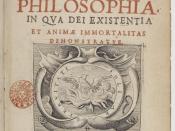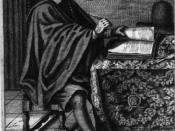Chris Mendivil
Philosophy
Isaac
"The Reality of Our Existence: The Matrix and Descartes"
Released in 1999, "The Matrix" managed to captivate audiences all over the world with innovative slow motion fight scenes, incredible special effects, and with the introduction of the often imitated directing technique, the "Bullet Time"; and whereas these certain components made the film incredibly successful and a cultural phenomenon, a great deal of the most important philosophical aspects of the film were often unnoticed by the general public. The Matrix is not just your typical save-the-world action movie, it is in fact, much more than that. It is a deep reflection on human kind and where we are headed, one that can easily be paralleled with the ideas of many philosophers. However, one stands out from the rest, as the filmôs premise is based on one question: "What if our reality was a lie?" Definitely, it resembles Descartes. The Matrix shares parallels with the theory of the senses and the evil deceiver theory of Descartes.
Descartesô philosophical stand point about the senses is commonly used throughout "The Matrix". During his lifetime, Descartes developed a very peculiar and unique method of fundamental questioning. The method of doubt. This consisted on being skeptical about everything in the world, no matter how familiar it could be. After having some thought, Descartes came to realize that everything he knew came from his senses, which he thought were not reliable enough to determine an absolute truth, as we are often cheated by them. This led to a complete distrust toward the senses, one that is used at earlier parts of The Matrix as a plot point. This is represented on the following quote:
Morpheus: (to Neo) "What is real? How do you define, 'real'?...


